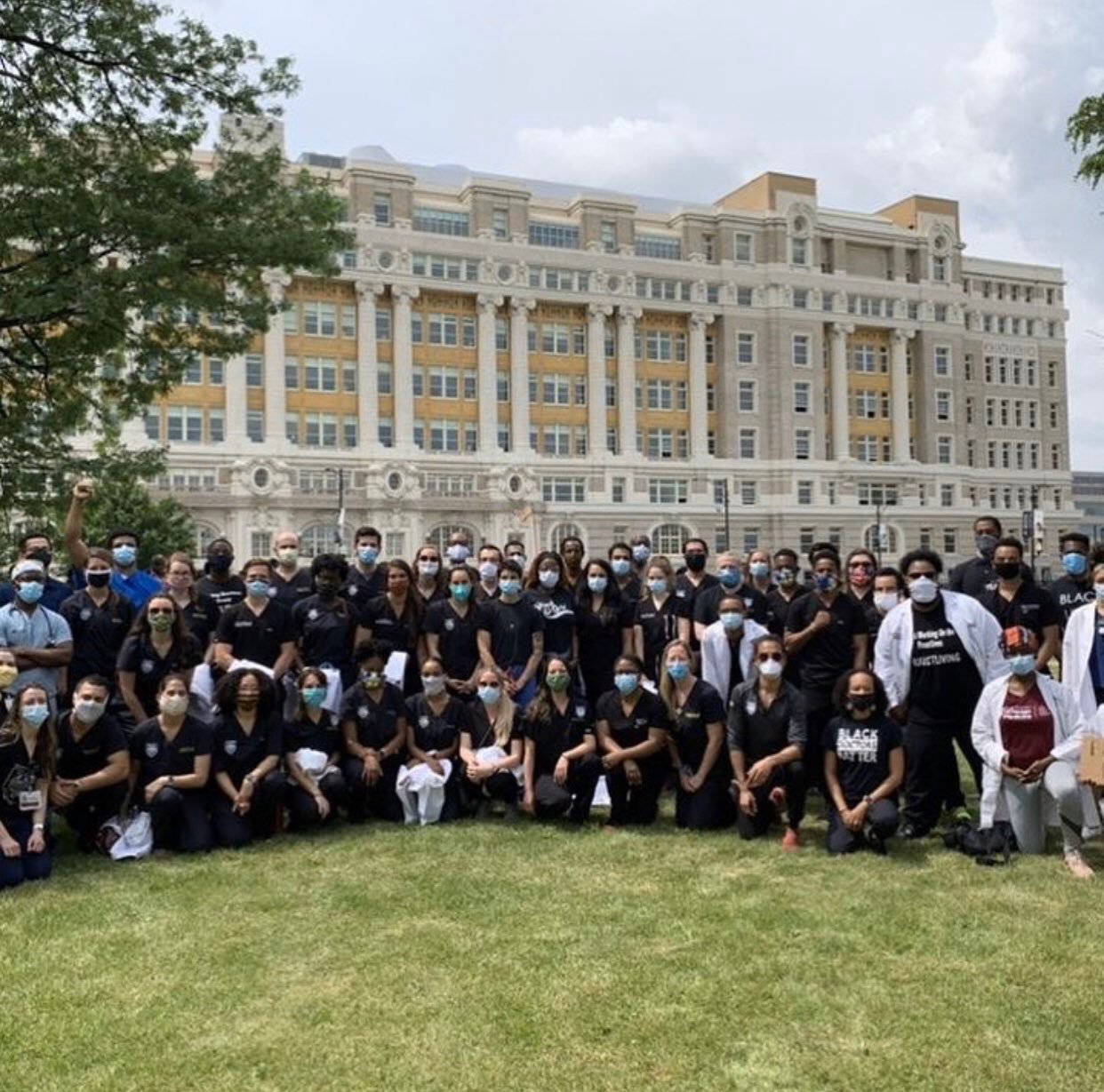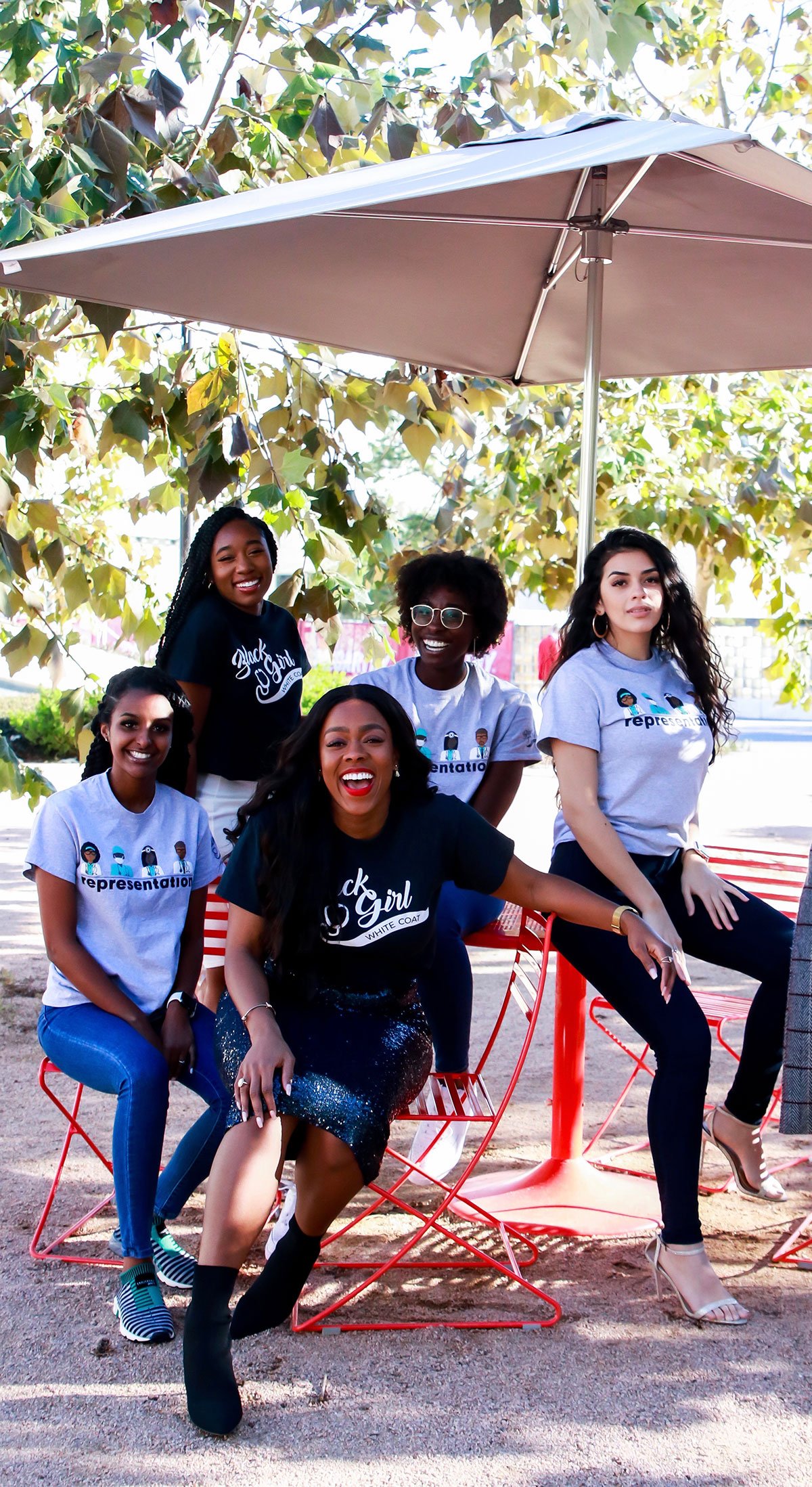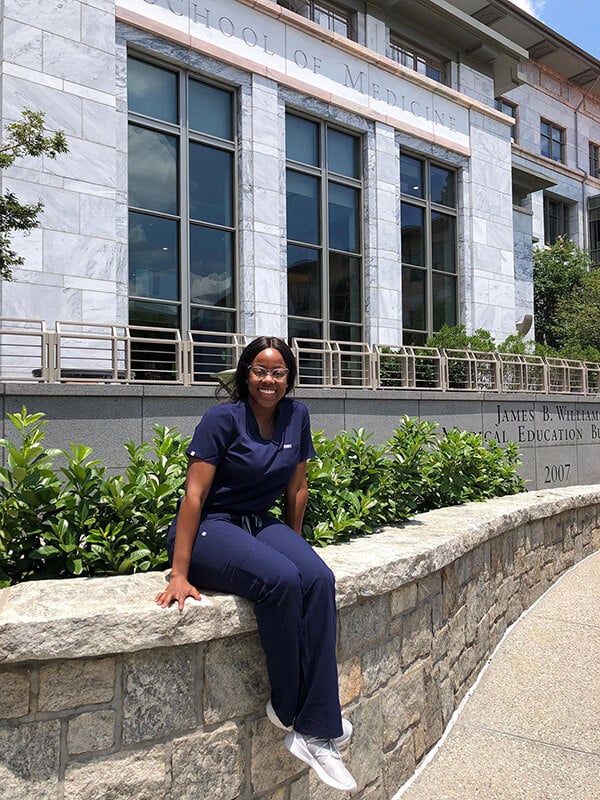If life was her childhood dream, right now, Houston’s Sandra Coker would be one of the best basketball players in the NBA.
A first-generation Nigerian-American, Coker would be following in the footsteps of her heroes, Houston Rockets icons Steve Francis and Cuttino Mobley, perhaps using her trailblazing platform to highlight racial injustice in the United States.
With the NBA yet to break the gender line, Dr. Coker has taken her steely-eyed determination elsewhere, with medicine the benefactors.
Coker is also the founder of Black Girl White Coat, a nationwide non-profit organization dedicated to providing support for the next generation of healthcare heroes from communities of color, inspiring the ones to come of the importance of their representation in medicine, and promoting more conversation about racial disparities in medicine.
“It was something I became very sure of, and very attracted to at a very young age,” Coker says, of becoming a doctor.
“Since then, you can go back to my middle and high school paperwork. When there’s a blank for ‘what do you want to be, when you grow up?’ It has always been a doctor.”
Coker’s father, Shawley Sr., came to America on a track scholarship in the 1970s. From Mississippi State University, his interest in engineering and business management continued as he solidified for himself a career in the oil and gas industry in the South.
After working in Houston, he and Coker’s mother, Hilda, married and laid their roots in Texas in 1989. Sandra came along in 1994, a little sister to Shawley Jr, born two years earlier.
After her mother, a respiratory therapist who’d raise two children by herself, told her that a career in the NBA was unlikely, Coker’s medical dreams were born during regular trips to her mom’s workplace. Being around medicine, and medical professionals has felt like home ever since.
“There’s just something about being in a hospital that fascinated me from the first time we went to visit my mom at work,” she says.
After maintaining a pre-med track at Baylor, where she graduated with a BSc in psychology, Coker headed to med school in 2015; the same year she founded Black Girl White Coat.
Noticing racial inequality in medical education

While she enjoyed her time at med school, Coker believes medical education definitely exposes students to the racial inequality that exists in the field. Students are offered two choices about its presence, she says.
“Coming from Baylor, I was pretty used to being the one [African-American] in many classes, or one of three or something, in an organization or class,” Coker says.
“I was used to that. [But] the fact is, you go into medical school thinking everything is ‘easy, breezy, beautiful’ and then realizing that there are microaggressions, and realizing there are racial injustices. Realizing that there is a good chunk of medicine that is racially skewed.
“Coming to that realization and that reality is harsh. It dampens your spirit a little bit, but then there are two ways that students tend to go when they are presented with this information.
“Either you are inspired more to fight for your patients, to fight for your communities. To speak up for the marginalized, to speak up for those who don’t have voices. To speak up for those communities, the black and brown communities specifically that are facing ungodly healthcare disparities.
“Or you go the route of seeing the information, learning it for the test and not letting it change the way you practice medicine. You don’t let it really upset the way you’re going to practice, you don’t really think it applies to you or is applicable to where you would like to practice in the future.
“You have your mind set on one way of medicine, and you’re okay with that. I chose the former.”
Black Girl White Coat is rooted in that deep, personal passion. Initially a YouTube vlog where Coker would talk about her experiences as a black med student, the message grew to Instagram.
White Coats for Black Lives
Following the violent death of George Floyd, the Black Lives Matter movement has led calls against racial injustice, inspiring demonstrations across the U.S, and international demonstrations of support from Germany to New Zealand.
Coker took a few days to personally grieve Floyd’s murder, at the hands of four Minneapolis police officers, checking in with her family, and steeling herself for the difficult fight that exists within her nation, and industry, for change. Last week, she joined several hundred medical professionals in a White Coats for Black Lives demonstration in Chicago.
Coker believes she has seen evidence of self-examination within the medical industry, following Floyd’s death.
“I think the healthcare community has been forced to take a second look about what we were talking about in the first place,” she says.
“What are these healthcare disparities that we were talking about? What do they mean when they say systemic racism is a public health crisis? What do they mean, and why are they saying it?
“I think we’re forcing people to take a second look and to try and educate themselves, and understand. Right now, the response we’re seeing from the healthcare community – I think it’s good. I think there are definitely steps in the right direction.
“Do I think it’s the final, end-all answer? No. I think work has to continue to be done. Policies have to be revisited and new laws need to be enforced. Special consideration needs to be given to the marginalized and the oppressed. Resource allocation and access to adequate healthcare need to be discussed in rooms that I may not have access to just yet.
“I think that everything we’re doing now will inspire the generation that is to come and then they can join us in this fight against systemic injustice in med school or nursing school right now, and they need to pick up their torches and do the work as well.”
Asked about which immediate changes she would make within medical education, Coker says she feels uncomfortable about how standardized testing uses question stems that funnel diseases towards certain races. That, she says, should not happen.
“Teaching students, future health care professionals, in that manner, on that ground, is a recipe for bias in their practice,” she says.
“You can’t teach a student that if you see this kind of person, then think of this automatically. That sets the stage for health care disparities, differences in quality of care and how people are perceived when they present to your clinic or emergency room.”
Frustration and hope
With every kernel of hope comes a heavy topsoil of resistance to change. Like the physicians of the Medical Committee for Human Rights during the Civil Rights movement, the doctors who stand with Black Lives Matter will undoubtedly face difficulties along the way. Coker knows that frustration is part of the struggle.
“There are definitely many moments of frustration in the career of a [black] health care professional in the education and academic process,” the young Texan says.
“In every sphere, there is frustration for us. A lot of times when we don’t feel like our voice is heard, when we don’t feel like action is taken, we’re not taken seriously or things aren’t implemented in a timely manner.
“I don’t think we’ll ever understand why it doesn’t happen, because the evidence is there. Yea, it’s frustrating. But also there’s a sliver of hope. I don’t think minorities would go into healthcare or medicine if there wasn’t any hope;- if we felt that all hope was lost.
“I know that I’m doing this not only because I’ve always wanted to be a doctor, but because I want to speak up for those that can’t speak. I have a voice and I can speak. I have a platform, and I can speak. I can help. I have the tools and education to help. My hope is I can pass this on for free. I can pass on the hope, the education, and I can speak up for the marginalized.

“I can do my best with the tools, the luxuries and the privilege that I have, for the next generation. That’s the hope we hold on to, when it gets super frustrating.”
Coker might not have grown up to do the thing she thought she might have been, when Francis and Mobley were her heroes.
But when you meet a young, determined black doctor driven by the necessity of long overdue change, you can make this story a case of the NBA totally missing out.
You can find Black Girl White Coat's website here: https://www.blackgirlwhitecoat.org/



